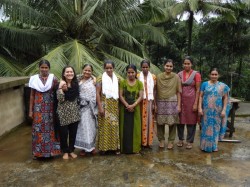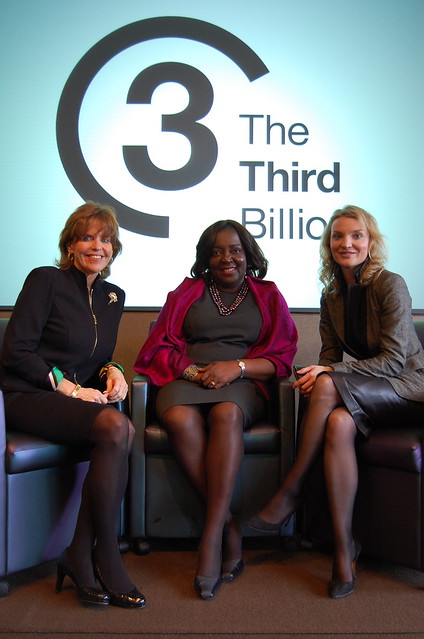Women empowerment – those two words are indispensable to the vocabulary of a student of a women’s college. I couldn’t tell you how many times I’ve heard those words being used in both daily (yes, daily) and professional discourse on my campus over my past two years as a student. Don’t get me wrong, I’m not saying this is a bad thing at all. In fact, it’s to be expected since women’s colleges are the very embodiment of women empowerment; the mission of most women’s colleges is to provide women an education of high-caliber so as to equip them with the knowledge and skills to make positive contributions to society. This is a wonderful goal and I can proudly say that the women’s college I attend does a fantastic job of achieving this goal. But in the excitement of fostering the next generation of women leaders, there is the danger (of which I am particularly prone to) of getting caught up with the “power” in “empowerment” – becoming more concerned with well-established women attaining a higher status in society as they become CEOs and presidents when there is a whole different group of women who, if they had just a fraction of the power we already have, could experience a standard of living that is just a little bit over the bare minimum. I am reminded, especially through my internship this semester at Profugo, of the women who are far more entitled to the “women empowerment” I have taken for granted; I will refer to these women henceforth as the “Third Billion”.
Who are the Third Billion?
The term “the Third Billion” was coined by global consulting firm Booz and Company, who in 2010 published a study on rising potential of women in the global market. According to the study, 870 million women in both developed and developing countries who have been living at subsistence level will emerge in the mainstream economy for the first time as producers, consumers, employers, and entrepreneurs within the next decade. That number will easily exceed a billion beyond the year 2020. These women are called the “Third Billion” because this group’s impact on the global economy will be as significant as that of the populations of China and India, who both hold a billion-plus people respectively. The studies of Booz and Company, along with other data analyses, are all strong evidences that these women are key to spurring economic growth across the world.
However, the Third Billion are not yet ready to take their place in the economy. The Booz and Company study also shows that these women are either unprepared (they lack sufficient education) or unable (they lack the support of their communities) to become the next producers and entrepreneurs. There are also several resources crucial to their economic success that many of these women lack access to. These include:
- Access to legal protection: The current system in many developing countries do not guarantee women’s property rights, protect women from domestic violence, or ensure safe working conditions and fair wages for women.
- Access to finance and markets: Many of the Third Billion do not have access to banking services and other resources that would otherwise allow them to become entrepreneurs and enter the mainstream economy.
- Access to education and training: Most of these women were not able to complete basic education.
If the women of the Third Billion were given access to these resources, we would have a billion more individuals entering the mainstream economy, contributing their skills and innovative ideas to the global market, and thereby drive economic growth. Economic growth can be defined in more ways than one: higher levels of GDP, higher standards of living, higher standards of health and education. However you define it, the overall well-being of our nations are strongly related to the economic status of women in society, and we could experience even greater prosperity if these women were given the right opportunities.
So the women of the Third Billion have been recognized, and the barriers to their economic development have been identified. Now it begs the question…
What has been done for the Third Billion?
Recognizing that the Third Billion cannot reach their full potential on their own, La Pietra Coalition created the Third Billion campaign; an initiative that works with governments, non-profit organizations, and youth to properly prepare women to enter the global economy. The campaign seeks to break through the identified barriers and to equip women with the resources to ensure access to legal protection, finance and markets, and education and training. In addition, the campaign strives to raise awareness of the plight of the Third Billion so that more people may join the campaign’s efforts.
One of the campaign’s noteworthy achievements includes the petition sent to the G20 summit in Mexico this past summer. The petition requested the leaders of the G20 countries to include women’s economic development in their global agenda; more specifically, they called for more of the G20’s efforts to promote the effective access to financial services for women and the protection of women’s property rights. The campaign met incredible success, as the G20 nations agreed and committed to working towards the economic and social equality of women and the expansion of women’s economic opportunities in their own countries. The World Bank and the OECD also agreed to collect and analyze data, and publish progress reports about the barriers women face in terms of economic opportunities which would thereby provide evidence and possible solutions. This was a remarkable accomplishment, as it marked the first time that the world’s leading economic nations clearly stated their commitment to women’s development. That the nations have recognized the need of the Third Billion is the first step to attaining their economic equality.
 Why does this matter to Profugo?
Why does this matter to Profugo?
As an organization committed to International Development, we at Profugo agree that the economic status of women is intricately related to the growth and well-being of the global economy. Giving economically-suppressed women access to the right opportunities and resources would help alleviate poverty and foster economic growth across many developed and emerging countries.
But that, I think, is only half of the story. It is not as much the prospect of a multiplier effect a billion women will have on the economy as much as it is the lives of the billion women that draw our attention. While both the Third Billion campaign and Profugo are all about international economic development, we are also dedicated to empowering women so that they may rise above their circumstances and lead sustainable and fulfilling lives. This is something I know to be true through my internship at Profugo these past couple months; I have seen the staff work hard to launch the Profugo store so that the women of the Tailoring Training Cooperative will be able to sell their handmade products for profits that will benefit their community. Profugo uses these programs in hopes that the women in this cooperative will be empowered with the skills and confidence to work so as to sustain themselves, their families, and their communities.
It is this model and the Third Billion campaign that demonstrates what women empowerment truly is: it is giving women the power to lead abundant, fulfilling lives that they are entitled to but which their circumstances do not allow. It is enabling them with the power to experience the freedom and security to own land; to use their personal skills to produce and sell goods and even become skilled entrepreneurs; to provide for their children without compromising their health or safety; and to be sound leaders recognized for their dedication to improve their communities. These are rights that many of my female counterparts here are free to exercise, but are luxuries to a billion women across the nations. Women empowerment, then, is turning these luxuries into “givens”, a part of their daily lives. Women empowerment, then, is not just indispensable to my vocabulary; it is indispensable to a billion women who we want to offer a better quality of life.
For more information about the Third Billion, visit www.thethirdbillion.org.



Leave a Reply
You must be logged in to post a comment.